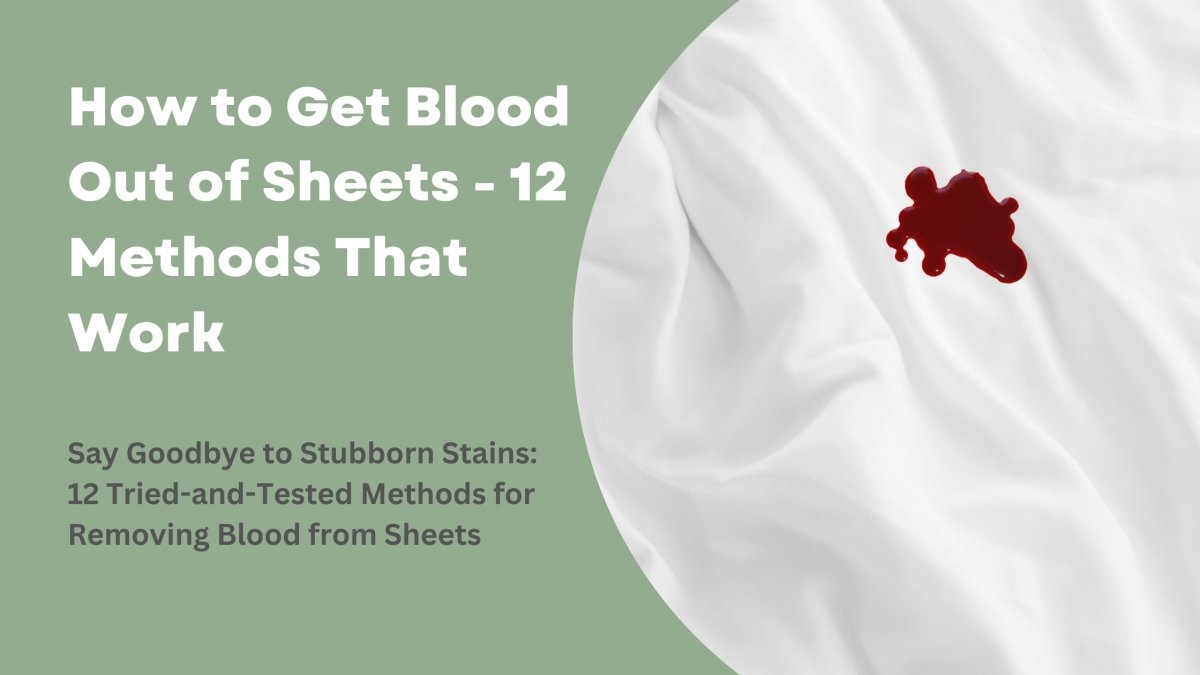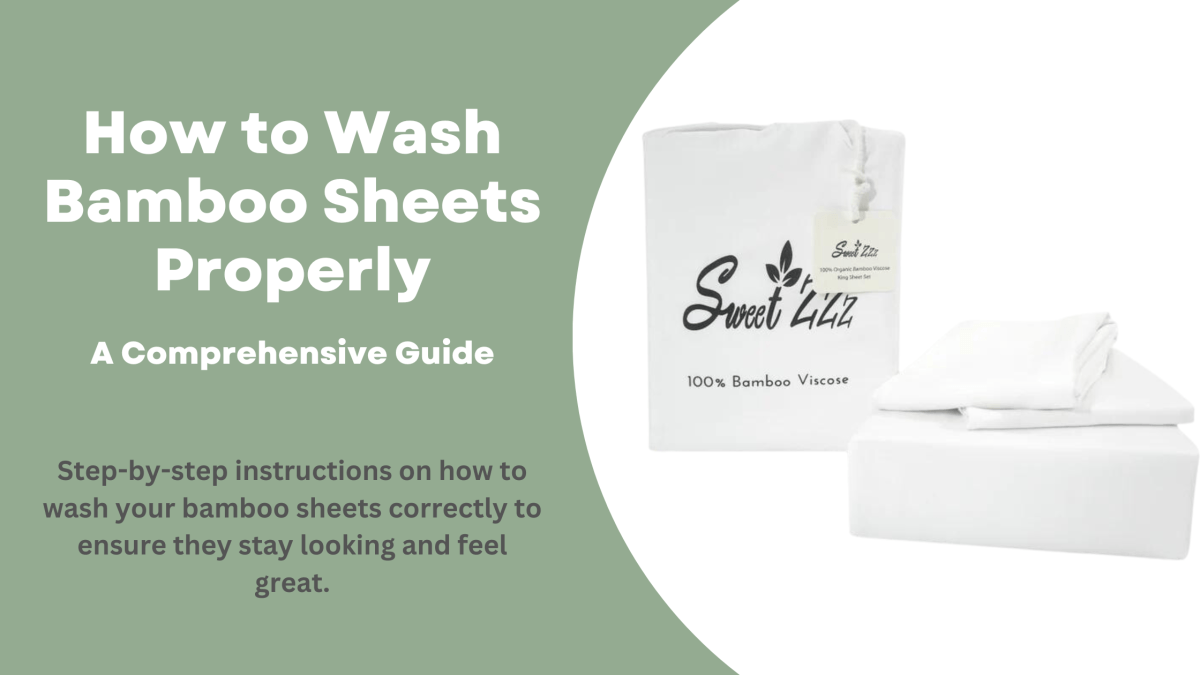How to Get Blood Out of Sheets - 12 Methods That Work
How to get blood out of sheets? Blood is one of the most difficult staining fluids known to the human race. Once it gets onto something, it will not come off for love nor money. And while it may eventually fade, the stain will always be an unpleasant reminder. It's so hard for us to comprehend sometimes. All of our great, technological advancements, taking a picture of Pluto, cloning a sheep, etc., and we can't come up with a surefire, fail-proof way to get blood out of fabrics and sheets?
For women, this is a particularly familiar problem. So, to help provide some relief, here are 12 methods for getting blood out of sheets.
1- Cold Water
The key word is 'fast'. Use cold water and dab at the sheet as quickly as possible, from the moment you first spot the stain, preferably. Afterward, dab it with a little shampoo and keep up the process until the stain reduces. Hot water is never a good idea to use with any stained fabric since the heat can sink the stain in even deeper than it was before.
2- Lemon Juice/Hydrogen Peroxide
This one is helpful for stains that have been there for a while. These two powerful liquids have a tendency to act a bit like bleach, so it's best to use on lighter fabrics. Dab the juice or peroxide onto the stain and gently repeat until the stain fades. Many people will recommend the hydrogen peroxide over the lemon juice since it seems to do the better job of the two, lifting the stain away much faster and more efficiently.
3- Meat Tenderizer
No, we're serious. Make sure it's an unseasoned meat tenderizer and sprinkle the dry powder on the stain before adding water and mixing it up until a soft paste is formed. Let it sit for an hour or so before rinsing it off and throwing into the washing machine. As a side bonus, your sheet may acquire a somewhat savory scent to it, but maybe that's just the delicious price to pay for an effective stain removal method.
4- Salt
This one is great for blood stains that have long since dried. Simply fill a bucket with saltwater and then wad up your sheets into it, letting it sit for at least three hours and then rinsing down with cold water. You can use a toothbrush to gently work the salt and water into the stain without damaging the fabric. You'll also lift up the stain in flakes by working it in this way, making subsequent washes more likely to remove even more of it. And you have virtually no excuse not to try this one, since I'd love to see you try and find us someone who doesn't have salt somewhere around their house.
5- Cornstarch/Baking Soda
Another great household item, simply mix a tablespoon with cold water and rub the paste into the stain on the cloth before setting it outside to dry in the sunlight. Use a soft brush to flake away any residue and be prepared to repeat the process as many times as necessary until the stain disappears. If you don't have cornstarch, check around for some baking soda, which can use the same mixture formula as the cornstarch, and also applied in exactly the same manner. And more people are more likely to have baking soda lying around than cornstarch.
6- Cola
This is a great one for if you're on the road and can't get any other of these items fast enough. Chances are there will be a vending machine nearby with the cola inside of it. Wad up the sheet into a bowl and pour the cola over the stained area. Let the stain soak in the soda for a few hours and then wash the sheet afterward. The stain should be more or less gone. And no, there's no need to worry intensely about whether such a corrosive chemical is okay to drink. Within moderation, the acid in our stomachs is more than enough to handle it.
7- Ammonia
Ugh, everyone's favorite thing. This one works on just about any stain caused by bodily fluids, so it's great to have around potty-training kids. Dilute the ammonia to half strength with water and rub on the affected area before throwing into the washing machine. If you can bet past the shocking aroma, it's a very effective method. Just be careful — the aroma to this one is enough to knock you on your backside and can become exceedingly dangerous if used in an area that isn't well ventilated. The fumes can also linger, so be sure to open any nearby windows if you're able to. This one comes up on a lot of questions asking how to get blood out of sheets.
8- Vinegar
You'll notice a lot of kitchen products on here. Next, we have vinegar, using one part cold water and three parts vinegar, soaking the sheets for a few hours. You'll then using a toothbrush combined with salt sprinkled on to loosen any remaining particles. You'll almost always find a bottle of this stuff lurking in a pantry somewhere, so make use of it when you can find it.
9- Dish Soap
When washing anything with a heavy stain, always, always, ALWAYS use cold water, since hot water may cause the stain to sink even deeper. And you can replace the detergent with ordinary dish soap for a stronger effect. Just make sure to air dry after it comes out. There's a reason that some varieties of dish soap are favored for oil spill projects. The reason is that they really do have a serious knack for getting hard stains and clogs out of greasy, oily objects. When it comes to how to get blood out of sheets, this is one surefire and easy way to go.
10- Chlorine Bleach
This is more of a daring one since you'll need to follow the instructions exactly to avoid ruining your clothes. But the powerful chemicals can almost literally lift the stains away from your sheets. Be warned though —it can also lift away color as well. The instructions will be printed on the bottle so read them carefully before using it, lest you damage your clothing and sheets while just trying to fix them.
11- Contact Lens Solution
No, really. Hear us out. If you have to wear contacts, the chances are good that you have this stuff sitting around your house somewhere. If you do have a good full bottle of the stuff, spray it all over the stain in question and let it sit. Try to give it as much time as you can and then rinse it out. If your luck holds out, the stain should be considerably smaller.
12-White Wine
Oddly enough, it does actually make a difference, at least enough of one for any number of other, more powerful methods to finish the job once and for all. Simply dab it onto a patch of stained sheet and, just like the others, let it sit for one to three hours. Afterward, simply rinse it with cold water. The stain may actually have faded quite a bit in that short time. It's a good pinch method. When it comes to how to get blood out of sheets, sometimes you just have to experiment and get a little kooky.
Conclusion
These aren't perfect methods by any means, and some of them are going to work better than others. The general consensus seems to be the hydrogen peroxide, which is favored for its hygienic properties the world over. Ultimately, it's your sheet and your issue, so you can deal with it as you see fit. You'll want to do what is ultimately best for both yourself and your own health, and for the fabric of your sheets. You don't want to damage them even further than you already have because good sheets are expensive.
It's always best to try to preserve the ones you have to save yourself an expensive replacement set every few months. So experiment if you can; try out different methods on stains with test fabrics to find out what works best for your particular situation. But be careful; some products like Chlorine bleach and ammonia can actually become dangerous when used together and create deadly fumes when applied incorrectly.
Always read the labels to make sure you don't mix anything you shouldn't, especially if you have small children running about. But at the end of the day, the most important thing is that one way or another, you were able to rid yourself of that unsightly stain without fear of replacing yet again. So be proud of yourself for your accomplishment; blood stains are certainly no laughing matter.




